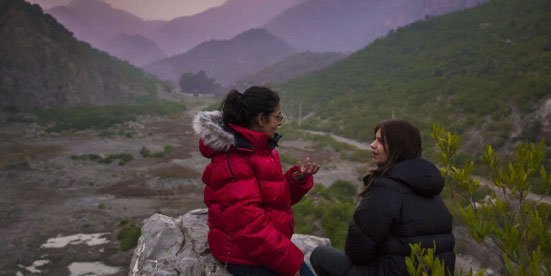
Sabiha Sumar and Kalki in Azmaish
Sabiha Sumar directed the Locarno Film Festival winner Khamosh Paani starring Kirron Kher. But amongst many other achievements, she is also the co-producer of the Emmy- and Oscar-winning documentary Saving Face and her film Dinner with the President was a Sundance Film Festival Grand Jury nominee. Our Swati Sharan shares snippets from her conversation with Sumar about her latest documentary Azmaish (read the review here) with Kalki Koechlin (read her interview here), which was featured at TIFF 2017 and her experiences with being in India over different periods of time.
On religious fundamentalism…
Starting in 2013, Azmaish took almost four years to make and many socio-political events took place in between this in both India and Pakistan and Sumar wanted to record these changes. One outstanding factor amongst these was the rise of religious fundamentalism whether it was within one’s own religion or towards another’s religion.
When asked about how Sumar depicts the impact on minorities in her films including using Kirron Kher in Khamosh Paani as a converted Muslim from partition times, she said:
“Is this all you see? The film is about the relations between a mother and son and the rising level of religious fundamentalism. It isn’t about the impact on minorities. Religious fundamentalism can be shown towards people of the same religion.”
On living in India…
The filmmaker lived in India for 10 years as her husband was a scholar with JNU (Jawaharlal Nehru University) in Delhi. About this period, she says, “We have very fond memories of our time there. We made good friends and we really enjoyed ourselves.”

Sabiha and Kalki on location
On travelling between borders…
When asked to compare the ease of her travel experiences between India and Pakistan from her youth till now, the director attests, “Travelling between both countries was never easy. In fact, between 1965 to 1979, there was a travel ban between India and Pakistan.” But her father loved to travel so as a child she got to see different places in India.
On making Azmaish accessible in India and Pakistan…
In terms of what plans there were to release the film in India and Pakistan, Sumar talks about using travelling cinema as a way to make the film available to the masses. “It’s what I did with Khamosh Paani. We had a crew that went to the different cities and towns in Pakistan and showed it there. I wasn’t able to be at all of these, but I tried to go as much as I could.”
When asked about the cost-effectiveness of the event, she mentions, “It can get to be quite expensive. So we did fundraising beforehand.”



0
comments